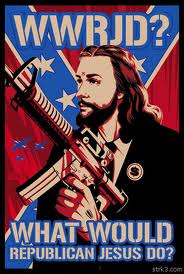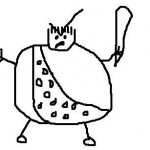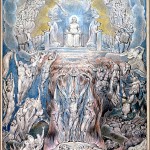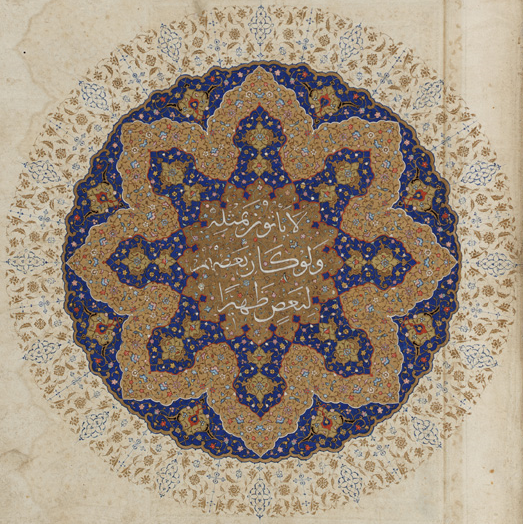When I was growing up, I believed our church to be mostly apolitical. This was because we were anti-dominionist. As premillennialists (Christians who believe that Christ will return before the millennium, a period of paradise on earth), we believed that Western government was irredeemable and that getting involved in politics was submitting to “the prince of this world,” Satan. The only salvation for the earth was Christ’s return and the expurgation of the wicked. We were supposed to observe the darkening of the world stage with our prayerful hopes pinned on the skies. We did not want to stand in the way of God’s plan by pushing politics in one direction or another.
So why did we always vote for Republicans?
In this way, we were part of the American evangelical machine. Voting for a Democrat was tantamount to publicly denying Christ. When pressed, we would have probably argued that it all hinged on abortion. I don’t think it did, though. I think that we were playing identity politics. I think we were partisan for partisanship’s sake.
Our worldview demanded forces of good and evil, so it made sense that our dual political parties would reflect the great cosmic battle. We were warned that there would be wolves in sheep’s clothing, Republicans who promised to fight evil but did not deliver, but it was a given that Democrats were a lost cause. Kennedy had been a Democrat, and William Branham, our founder, had suspected that Kennedy would usher in the antichrist because he was a Catholic. (The Pope was basically the Dark Lord of All, as he had been since the sixteenth century.) When Kennedy died and decades passed, the focus shifted to Clinton and homed in on his sexual sins as evidence of Satan’s working in his life.
All this drama rested beneath the surface, though. When politics came up, the response to Democratic candidates was always a generalized disgust. “He’s a liberal” was enough to dismiss a politician, his views on policy unseen. A conservative appeared on my facebook feed recently arguing that young people were “duped” by Obama and their only hope was Romney – but he didn’t say for what. As a young person, I can say I’m pretty excited about the Affordable Care Act and getting my peers out of Iraq. My father recently told he that he was “sure as hell not voting for Obama.” But after growing up listening to him yelling at the television my whole life, I still have no idea what it is about liberals and Democrats that my father hates. Other than their being liberal Democrats.
When I turned 18, it was a presidential election year. I secretly voted for John Kerry. I was terrified of Bush, but also terrified that God would punish me for siding with a liberal Catholic. When Bush won, I was relieved, though not for the same reasons as everyone else. While others in my church breathed sighs of relief that the Rapture wasn’t coming yet because a True Christian was in office, I was just happy that my vote hadn’t really counted. I could not be blamed, one way or another (although an irate French guy in the Charles de Gaulles airport, years later, didn’t seem to realize that).
Since my first vote, I’ve watched America polarize. I’ve been more and more frustrated that our political parties are like football teams: you buy the merchandise, stick it on your car and scream about what losers the other side’s fans are. You posture and talk philosophy, but you don’t engage any complicated issues. Politics is run like a black box, where only the best-paid technicians get to see what’s under the skin of the government. It’s become a sport to hate the government.
It frustrates me. It bothers me that our parties have devolved into liberal and conservative social values, such that there’s no meaningful choice between them anymore. Either you agree with one’s philosophy or you don’t. Either you join one camp or you get pushed into the other. For my entire adult life, I have felt attacked by the Republican party because of its vicious focus on patriarchal gender norms. I would like to have a legitimate choice to vote Republican or Democrat, but part of the hazing ritual for Republican candidates now is that they trample all over my right to earn a wage equal to my male colleagues and control what happens to my body if I accidentally become pregnant. These are not the issues I want to vote on. I want to think seriously about the economy and talk about complex policies. I want to talk about eliminating poverty. But how can those conversations inform my vote when I have to give up my own body to consider a Republican? Even if they have good economic ideas, I’m scared away from Republican candidates by the specter of the 1950s and back-alley abortions.
I don’t think both sides are “equally bad.” I think the problem is political Christianity. I think the Moral Majority that attached itself to Reagan in the 1980s has grown like a cancer to the point that it, along with corporate campaign financing, has shut down the vital organs of democracy. America is no longer a country where citizens band together for the betterment of the whole nation (if it ever was, I leave to American historians). Instead, when we go to the polls, we think about our own tiny ideologies and loyalties and our “stance” on philosophical issues, not the big picture. Not the way economic policies actually work. When was the last time we all sat down to listen to a lecture by an economist on the latest research on foreign policy and trade?
Politics should be made of all that “boring” stuff. It shouldn’t be a football game. It shouldn’t be about religious stance, either. We should be able to disagree about everything else but vote for the same person because we think he or she stands the best chance of improving our infrastructure or lowering our deficit. We should be able to be Christians and vote for atheists who have good ideas about Medicare. We should be able to vote for Muslims, Jews, Buddhists, agnostics, or traditional Christians when we think they’ll help fix the foster care system.
But what do I know? I guess I’m just some Democrat.













